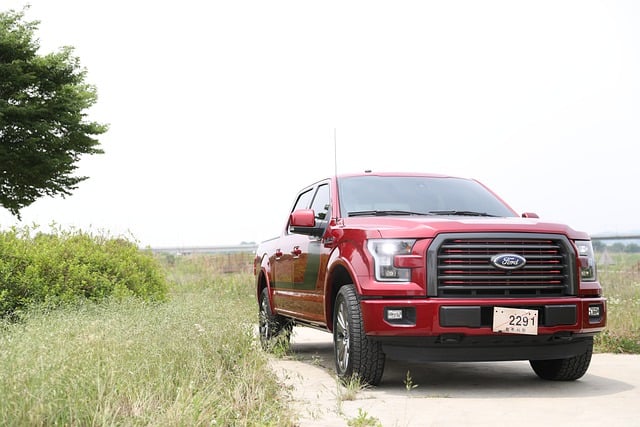When confronted with a truck that’s sluggish to start or headlights that dim, it’s a telltale sign that your truck battery might be on its last legs. This article delves into the symptoms of failing truck batteries and how external factors like extreme weather can affect their performance. We’ll explore the indicators that signal the need for maintenance or replacement, ensuring you understand the health of your truck battery. From understanding the signs to knowing when professional guidance is necessary, this comprehensive guide provides the insights needed to keep your truck’s power source reliable and strong.
- Understanding Truck Battery Health: Key Indicators of Failure
- The Role of Extreme Weather Conditions in Truck Battery Performance
- Identifying and Interpreting Dimmed Headlights and Sluggish Starts
- The Importance of Regular Maintenance and Its Impact on Battery Longevity
- When to Replace Your Truck Battery: Professional Guidance and Recommendations
Understanding Truck Battery Health: Key Indicators of Failure

When it comes to maintaining your truck’s reliability, understanding the health of your truck battery is paramount. A well-functioning battery is the lifeline of your vehicle’s electrical system, powering everything from the ignition to the entertainment system. To ensure your truck battery remains in optimal condition, there are several key indicators that you should monitor regularly. Firstly, pay attention to the battery’s voltage level when the engine is off. A fully charged battery should read around 12.6 volts. If your battery’s voltage dips significantly below this, it could be an early sign of poor health or impending failure. Additionally, check for any corrosion on the terminals and cables. Corrosion can prevent a proper connection, leading to inadequate power supply and eventually causing the battery to fail. The presence of a white, powdery substance around the connections is a clear indicator that maintenance is required.
Another critical aspect to consider is the age of your truck’s battery. Most batteries have a lifespan of about three to five years, though this can vary depending on factors like climate, driving habits, and the type of battery. Regularly inspect the battery case for cracks or bloating, as these can compromise its integrity. Also, listen for any unusual sounds or notice any odd odors coming from the battery, as these could signal internal gassing or a potential leak, both signs of impending failure. Regular engine cranking performance should also be assessed; if you notice it’s taking longer for your truck to start, particularly on cold mornings, this could indicate that the battery is losing its charge more quickly than before. By keeping an eye on these indicators, you can proactively address potential issues with your truck battery and prevent unexpected breakdowns.
The Role of Extreme Weather Conditions in Truck Battery Performance

Identifying and Interpreting Dimmed Headlights and Sluggish Starts

If your truck’s battery is on the verge of failure, one of the early indicators can be dimmed headlights. When you turn on your headlights, they should illuminate the road ahead with a bright light that doesn’t fade quickly. However, if you notice that your headlights are appearing less luminous than usual, it could signal that your battery is struggling to provide sufficient power. This symptom often arises when the internal chemistry of the battery changes due to sulfation or other age-related issues, leading to a reduction in amperage output. Another concerning sign is sluggish starts. A healthy truck battery should have enough cranking amplitude to start your engine promptly, even in cold conditions. If you experience delayed engine response or notice the need for multiple attempts to get your truck’s engine running, this is a clear sign that your battery may not be holding a charge as it once did. This can be attributed to a decline in the battery’s capacity to store energy, which is essential for starting your vehicle’s electrical system. To address these issues, regular maintenance checks and professional assessments are crucial. They can help identify whether the battery needs replacement or if there are other factors affecting its performance, such as alternator problems or parasitic drains. Addressing these symptoms early on can prevent a complete battery failure, ensuring your truck remains reliable and ready for use.
The Importance of Regular Maintenance and Its Impact on Battery Longevity

Regular maintenance is a critical factor in ensuring your truck battery’s longevity and overall performance. Consistent checks on the battery’s charge levels, cleaning corrosion from terminals, and inspecting the fluid levels within the battery can significantly prolong its life. The electrolyte solution in a truck battery should be at the correct specific gravity for optimal function; this balance is crucial for the battery to hold and provide power efficiently. Neglecting these maintenance tasks can lead to sulfation, where sulfur buildup on the battery’s plates reduces its capacity to store energy. Furthermore, ensuring that connections are clean, tight, and free from corrosion is essential for preventing voltage drops that can drain the battery prematurely. By adhering to a regular maintenance schedule, you can minimize the risk of unexpected failures and extend the lifespan of your truck battery, thereby ensuring it operates at peak efficiency throughout its service life. Regularly scheduled maintenance not only helps in identifying potential issues before they become serious but also contributes to the reliability and safety of your vehicle’s electrical systems.
When to Replace Your Truck Battery: Professional Guidance and Recommendations

When addressing the issue of a failing truck battery, it’s crucial to monitor several key indicators that signal the need for replacement. Typically, a truck battery is expected to last between three to five years under normal conditions. However, this can vary based on factors such as climate, battery type, and usage patterns. If you live in an area with extreme temperatures, your battery may wear out faster due to the stress placed on it by hot or cold conditions. To ensure optimal performance, regular maintenance checks are essential. These include inspecting the battery’s hold-down clamp and cables for corrosion, ensuring the terminals are clean and tight, and regularly checking the electrolyte levels if you have a traditional lead-acid battery.
Professional guidance is invaluable when determining the right time to replace your truck battery. Mechanics and automotive experts often use specific benchmarks to advise on battery health. One of the most definitive signs of a failing battery is a diminished ability to hold a charge. If your engine cranks slower than usual or takes longer to start, it may indicate that the battery’s capacity is waning. Additionally, persistent warning lights on your dashboard indicating a charging issue should prompt immediate attention. Another critical sign is when the battery fails to start the truck after sitting for several days, especially in colder temperatures where the chemical reactions within the battery are less efficient. It’s important to address these symptoms proactively, as a dead battery can leave you stranded and potentially cause data loss in your truck’s computer systems. Always consult with a professional when in doubt, as they can perform a load test to accurately assess the state of your truck battery and provide recommendations tailored to your specific vehicle and usage needs.



